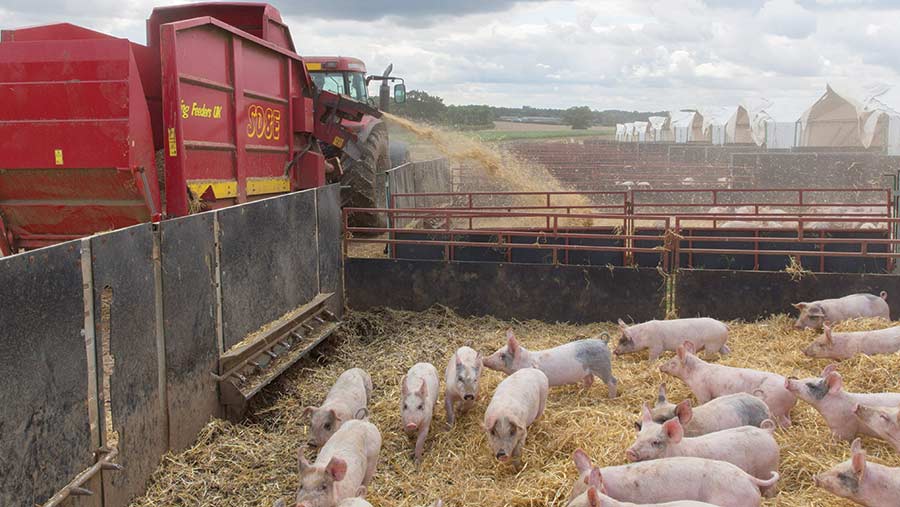5 tips for improving staff retention on your pig unit

The UK pig industry is making good progress with improving staff retention rates but attractive salaries alone won’t necessarily help businesses hold onto their best employees.
Incentives including additional paid leave to reflect years of service, and private health insurance packages are becoming more commonplace in pig systems overseas as producers seek to attract and retain the best people.
Andrew Palmer, a knowledge exchange manager with AHDB Pork, says he has seen an upward shift in salaries on UK pig farms, but warns that staff retention is not just about money.
“Employers are starting to recognise that good staff are hard to find and that they must work harder to keep them,’’ he says.
“Sometimes it is not all about the money. If staff have to work long hours in return for that financial reward, that can be seen as having a negative effect on them and their families.’’
See also: Guide to biosecurity measures to keep pigs disease-free
While career development and progression are being considered more in the UK pig industry, greater staff recognition and reward for long service could be an area the industry might benefit from exploring further, he adds.
Following a recent research visit to Australia, Mr Palmer gives his top tips for recruiting and retaining good staff on pig units and other farming sectors.
1. Reward long-serving staff with generous time off
It is not uncommon for staff on Australian pig units to be rewarded after 10 years of employment with an additional six weeks of paid leave.
This incentive grows incrementally the longer an employee stays in their job, he adds.
For every year staff remain on the farm, additional weeks of paid leave are gained and this can be accrued; some choose to save it all until they retire or bank it to take time out to travel for several months.
“One employee we came across had 32 weeks accrued,’’ says Mr Palmer.
But to make this work, employers must have systems in place to bridge gaps in their workforce when staff are on long-term leave, by training others to fill these roles.
Other farms take a different approach with time off, allowing employees to study for degrees during paid time.
2. Train employees to fill senior roles
Farm workers are often highly skilled and experienced, but continual work-related training and development opportunities to build on this can be highly motivational.
A 25,000-pig indoor unit Mr Palmer visited in Australia had, through training, created a strong team of qualified employees ready to step into senior management team roles when staff left or retired.
“This clear career pathway progression was built into the company’s ethos and was reflected in the number of applicants that came forward when the business advertised to fill vacant positions,” he explains.
“Training programmes embrace progression, recognition and reward and provide a clear direction in terms of career development.”
And the benefits to the company go beyond staff retention because, with appropriate training, employees can be empowered to do a better job.
3. Include job-related perks in employment contracts
Additional perks, large or small, can be a magnet for attracting staff. Mr Palmer says the new generation of employees increasingly wants to join a business that offers them a good quality of life, not just a healthy pay packet.
Health insurance for employees is not uncommon and this offers benefits to the employer too, he suggests.
“Employers are recognising that it can take more than six months for staff to get an NHS health appointment, diagnosis and treatment,” he says.
“Private treatment can see a valuable member of staff return within a couple of months and this can be a cheaper option compared with increased overtime while a member of staff is away from their job.’’
Mr Palmer says one pig unit employs an occupational health nurse.
“Regular health checks have found some personal health issues employees didn’t know they had,’’ he says.
Other benefits that feature more widely in employment contracts include mobile phone costs, fuel for travelling to work, and staff welfare provision.
“Clean, dry work clothes provision is becoming the norm and, along with good showering facilities, is not only good for biosecurity but helps with a company’s professional image,’’ says Mr Palmer.
4. Offer a good work-life balance
Production systems are changing and this allows staff to have more weekends off. Finishing work at around 3pm is now a regular feature on some units.
“We are now dealing with a generation that doesn’t want to work from dawn to dusk,’’ says Mr Palmer.
“I grew up on a farm and worked every weekend and holiday but the next generation place more value on their home and social lives; they want more regular time off.’’
If a couple work on the same farm, allow them to job share their roles as this creates flexibility for them both, he says.
Or, instead of the standard weekly hours a normal employment contract offers, give an employee the chance to do fewer hours, often to fit in with commitments at home.
5. Employ low-cost morale-boosting exercises
A staff breakfast in the farmhouse kitchen or ‘chip day’ Fridays are good for morale and provide an opportunity for employees to engage with their staff.
Family farms have a part to play by encouraging close personal working relationships with the owner.
“It can help employees understand the problems when times are tougher while providing rewards in the good times,’’ says Mr Palmer.
“Having breaks in the farmhouse kitchen or owners remembering the birthdays of their employees and partners can sometimes be more appreciated than a higher salary.’’
